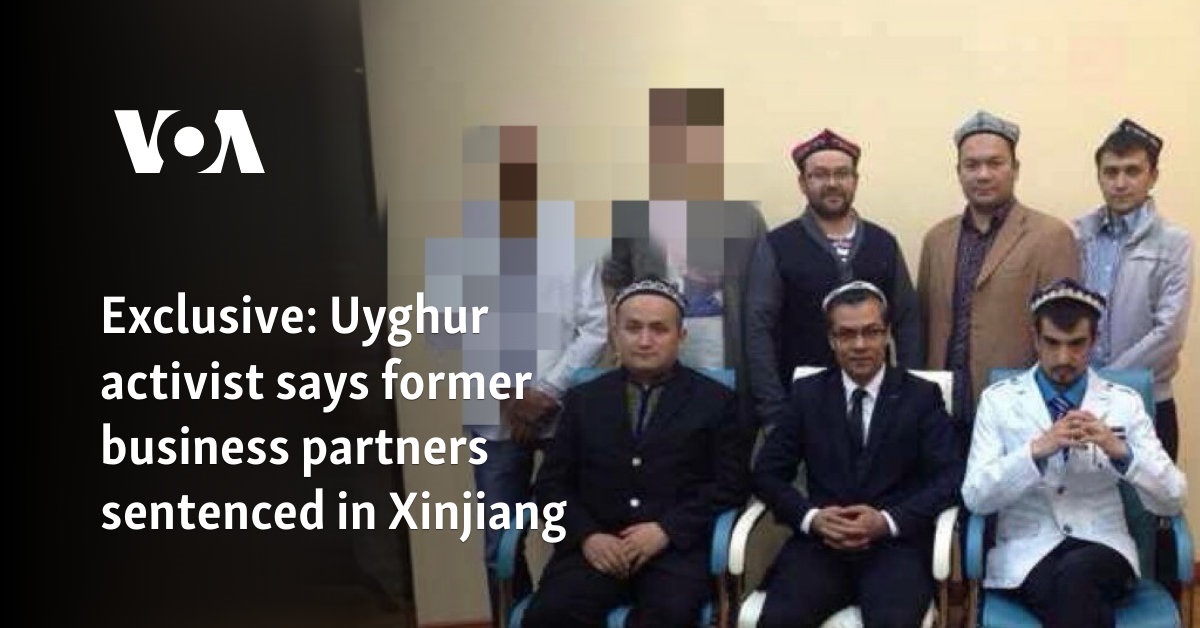Bussiness
Exclusive: Uyghur activist says former business partners sentenced in Xinjiang

Tahir Imin, a 42-year-old U.S.-based Uyghur activist and former political prisoner from China, tells VOA that he recently learned that six of his former business associates in Xinjiang were sentenced for allegedly attempting to split the country.
“I’ve learned from two sources that the sentences, handed down in early 2024 by the Urumqi Intermediate People’s Court, were linked to their association with me,” Imin told VOA. “One received 15 years, while the others got 12.”
Information in Xinjiang is tightly controlled, making it extremely difficult to get details about court proceedings. Imin — the founder of the Washington-based Uyghur Times and a member of the Washington-based Uyghur Human Rights Project — said his sources were unable to share documents for fear of retaliation from the Chinese government. Among those charged, he added, was the nephew of a top party official in Xinjiang.
The Urumqi Intermediate People’s Court is in the capital of Xinjiang, which is home to nearly 12 million predominantly Muslim Uyghurs. The U.S. and other countries have accused China of genocide in Xinjiang, where more than 1 million Uyghurs are believed to be detained in facilities that Beijing describes as vocational training centers.
China says the measures are necessary to combat extremism, terrorism and separatism. Some people have been detained for practicing their religion or for their contacts with overseas individuals who are speaking out about China’s policies in Xinjiang.
When reached for comment on the case, Liu Pengyu, a spokesperson for the Chinese Embassy in Washington, told VOA he had not heard of the cases mentioned by Imin.
“China is a law-based country where laws must be observed and those who violate the law must be held accountable,” Liu said in an email to VOA. “If the sentencing is linked to accusations of ‘attempting to split the country,’ please refer to Article 103 of the Criminal Law of the People’s Republic of China.”
Article 103 of the Chinese Criminal Law states that people who “organize, plot or carry out the scheme of splitting the State or undermining national unity” face life imprisonment or at least 10 years.
The sentences of 12 to 15 years for Imin’s former associates suggest they might have been charged under this article.
Not the first time
Imin believes the news about his former associates is part of China’s broader strategy of transnational repression against activists like himself.
It is not the first time this has happened to him, he said.
“Previously, I discovered that 28 of my family members were sentenced to prison simply because of their relationship to me,” he said. “I am deeply concerned about my daughter, who was forced to denounce me, and my estranged wife, who was forced to divorce me.”
Imin told VOA that he has not heard from his wife or daughter in years and has no way of knowing whether they are alive or living freely.
“That leaves me with a constant sense of guilt and sorrow,” he said.
Imin and the six sentenced business associates — Ismail Kerim, Elqem Ilham, Dawut Osman, Yashiq Ahmed, Nurmemet Imin and Rashidin Gheyret — founded Xinjiang Ottuz Oghul Import and Export Trading Co., Ltd. in 2014.
Imin left China in March 2017, first relocating to Israel before settling in Washington. After moving to the U.S., he lost touch with his former associates and began speaking out against alleged abuses in Xinjiang. As a result, his associates severed contact with him, leaving him unable to track the fate of the company they once shared.
VOA was able to find details about his import-export firm on Chinese company search websites. According to Alibaba’s 1688 business-to-business website, the company and its associates registered with the Urumqi Municipal Administration for Market Regulation on May 14, 2014, with Tahir Imin listed as the representative and chairman and the other sentenced individuals in administrative roles.
Imin says his former associates all had separate businesses, with their joint company serving as a collaborative venture.
“We were all well-educated and focused on business and social improvement,” Imin said. “Our company’s motto was development, cooperation and social responsibility.”
Family ties
Ilham, one of the former business associates who was sentenced, is a nephew of Kaiser Abdukerim, the current vice chairman of the Xinjiang Uyghur Autonomous Region, according to Imin.
VOA couldn’t independently verify the connection between Ilham and Abdukerim. Despite multiple calls to a number listed on the Xinjiang government website, the calls went unanswered.
Abdukerim has long been a vocal supporter of the Chinese government’s policies in Xinjiang. At the United Nations in 2018, as president of Xinjiang Medical University, he defended the government’s policies, calling them social progress even as allegations of mass detentions and human rights abuses were growing.
In March 2023, as vice chairman of Xinjiang, Abdukerim claimed on CGTN that international criticism of Xinjiang was an attempt to interfere in China’s internal affairs.
Restricted access
According to information collected by the Xinjiang Victims Database, which documents individuals affected by China’s policies in Xinjiang, all of Imin’s former colleagues were arrested in July 2021 on charges of problematic association. They later attended a hearing in March of 2023. Imin’s update about their sentencing is the latest on their status.
According to Gene Bunin, curator of the Xinjiang Victims Database, access to court verdicts and legal documents is highly restricted with the government now requiring users who want to access them to use Chinese platforms such as WeChat or AliPay.
“The other reason is that, even when accessible, they [Chinese authorities] generally did not post any of the sensitive cases, which is the vast majority of criminal cases for Xinjiang,” Bunin told VOA.
He said that in a study he carried out in 2018, only 7,000 of 70,000 criminal cases in Xinjiang had verdicts posted.
“This rate, of around 10%, was by far the lowest in the country, as for most provinces/regions at least 60-70% of the verdicts were posted,” said Bunin. “Of the 7,000 visible, almost all were for standard crimes that would be recognized anywhere in the world (drunk driving, theft, robbery, rape, murder, etc.), with essentially no political/religious cases.”
According to a Human Rights Watch report released in 2022 that was based on Xinjiang government data, more than half a million people had been prosecuted since 2017.










